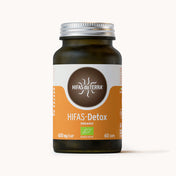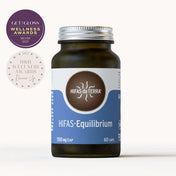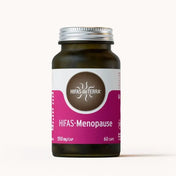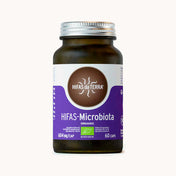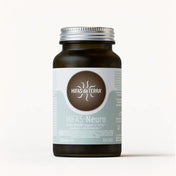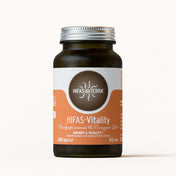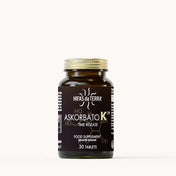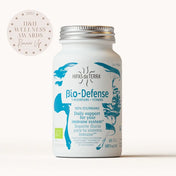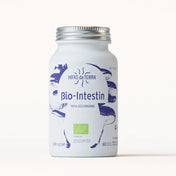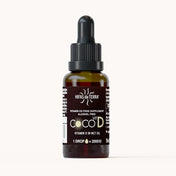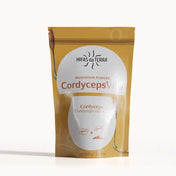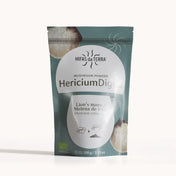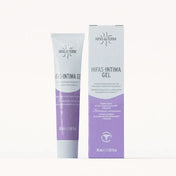The science behind Ashwagandha: properties and benefits for women

What is ashwagandha and why is everyone talking about its properties?
Ashwagandha or sleep berry, has earned a top spot among natural options for stress management and rest. Withania somnifera (its scientific name) alone or combined with vitamins, Reishi, Rhodiola, etc., is at the centre of the latest natural supplements aimed at emotional management, balance, calm, and tranquillity.
The growing number of scientific publications also influences this interest in ashwagandha and its benefits for women. According to Pubmed, there are a total of 1,932 articles on Ashwagandha and more than 800 have seen the light of day since 2020.
This plant is considered a natural adaptogen like Cordyceps or Lion’s Mane mushrooms. In general, these natural substances can help to better cope with situations of mental or physical stress and to promote the balance of the organism.
People who take ashwagandha regularly report feeling calmer and more balanced. The plant is also often mentioned in connection with sleep problems or inner restlessness.

Buy Ashwagandha? Effects and benefits for women
The benefits of ashwagandha on women’s health appear to be multiple and are currently being scientifically investigated in numerous studies. The effects on stress management, sleep quality and emotional and hormonal balance stand out.
Ashwagandha contains a group of active plant substances called withanolides. These are studied for their possible antioxidant, anti-inflammatory and nerve-protective effects.
Some scientific studies suggest that ashwagandha may help regulate the stress hormone cortisol [¹]. This may lead to a more relaxed body feeling.
The root extract is also frequently used to improve sleep quality. In clinical studies, test subjects reported that they were able to fall asleep faster and sleep more soundly if they had taken Withania somnifera root for several weeks[²]. The plant is also attributed with immune system support and antioxidant properties [³].
Other studies have investigated whether the Ayurvedic adaptogen can have a positive effect on people with mild anxiety or depressive moods[⁴]. There is also talk of neuroprotective effects, i.e., possible protection of nerve cells[⁵]. This evidence makes ashwagandha interesting not only for people suffering from acute stress, but also for those who wish to strengthen their mental resilience in the long term.
Use for hormonal fluctuations and emotional stress
Women can use ashwagandha, among other things, to stabilise hormonal balance and promote general well-being. Peri- and/or menopausal users especially appreciate the natural accompaniment during transitional phases, especially to promote sleep [6] and improve sexual function [7].

What pharmaceutical forms are available and how is ashwagandha administered?
Ashwagandha is available in various forms, although it is usually taken in capsule form. There are also powders, infusions or tinctures on the market.
Hifas da Terra offers a product specially designed for women that contains, among other natural ingredients, ashwagandha extract, the most concentrated form available on the market.
HIFAS-Menopause is a natural supplement to support the peri– and menopausal phases, with a combination of pure mushrooms (Lion’s Mane and Reishi) and high-quality plant and root extracts such as ashwagandha KSM-66 (5% withanolides) and green tea (95% polyphenols), probiotics. It has been developed to specifically support the hormonal and psychological changes of these phases.

What is Ashwagandha KSM-66?
The term KSM-66 is used to distinguish high quality ashwagandha products.
KSM-66 is the only plant extract that retains all the natural compounds present in the root and has been perfected for more than 14 years with the aim of combining the traditional Ayurvedic production method with modern scientific requirements. The extract contains a high proportion of withanolides (at least 5%), while maintaining the natural balance of other plant substances.
KSM-66 is obtained exclusively from the root, unlike other extracts that also use leaves.
Ashwagandha with other herbal substances
As mentioned at the beginning of this post, ashwagandha can be well combined with other natural active ingredients. Especially popular are formulas that combine ashwagandha with mushrooms such as reishi, cordyceps or rhodiola rosea. These combinations can be specifically tailored to different needs, e.g. to support concentration, relaxation or the immune system. An example of this is the Hifas Functionals products from Hifas da Terra, which are based on solid research and combine natural plant substances with pure mushrooms.
These are holistic formulas that address the body and mind in equal measure and therefore specifically promote mental balance, concentration and sleep:
- These include HIFAS-Neuro, a preparation to support memory and concentration. It combines Lion’s Mane (Hericium), Chaga, Bacopa, Ginkgo, Rhodiola and important vitamins to support the nervous system.
- In addition, HIFAS-Equilibrium offers natural help for women to better cope with daily challenges and hormonal fluctuations. It contains adaptogenic mushrooms such as reishi, cordyceps and lion’s mane, which can support inner balance.
If you want to buy ashwagandha, pure mushrooms or other medicinal plants, it is recommended to pay attention to the qualitative and quantitative details of each product. Products from controlled organic cultivation, without additives and with a clearly labeled content of active ingredients are recommended. And when in doubt, it is also advisable to consult a health professional.

Hifas da Terra - Quality, Research and Sustainability
Hifas da Terra is a biotech company with roots in Galicia. For more than 25 years, we have been passionately dedicated to biotechnology, with a special focus on the study and innovation of supplements from traditional folk medicine mushrooms, plants, roots and vitamins. As pioneers in this field, we not only research the effects of mushrooms such as Reishi, Chaga, almond mushroom and Cordyceps, but we also conduct clinical studies with prescribers, hospitals and universities to test our products.
Our motto: sound research, top quality and responsible use of natural resources. All our products are expertly developed, rigorously tested and sustainably produced. This is how we combine modern know-how with centuries-old traditions: to offer holistic, effective and reliable solutions from the natural resources around us.
What are the side effects of ashwagandha?
Ashwagandha is generally well tolerated and side effects are few and mild. Possible side effects may be gastrointestinal discomfort, mild tiredness or malaise. Therefore, people with sensitive stomachs should take the dietary supplement with meals and, in any case, it is always advisable to consult a professional.
Frequently asked questions about ashwagandha
- When are the effects noticeable?
Many people report initial changes within two to six weeks.
- Can ashwagandha be taken permanently?
According to studies, long-term use appears to be risk-free, but it is still advisable to consult a physician.
- Is ashwagandha also suitable for the evening?
Yes, many people take the herbal extract at night, as it can counteract inner restlessness or trouble falling asleep.
-
Chandrasekhar, K. et al. (2012). A prospective, randomised double-blind, placebo-controlled study of safety and efficacy of a high-concentration full-spectrum extract of Ashwagandha root in reducing stress and anxiety in adults. Indian Journal of Psychological Medicine. PMID: 31517876
-
Langade, D. et al (2019). Efficacy and safety of ashwagandha root extract in insomnia and anxiety: a double-blind, randomized, placebo-controlled study. Cureus. PMID: 33653516
-
Bhattacharya, S. K. et al. (2000). Antioxidant activity of Withania somnifera glycowithanolides. Indian Journal of Experimental Biology. PMID: 15740882
-
Speers, A. B. et al. (2021). Effects of Withania somnifera on neuropsychiatric conditions. Current Neuropharmacology. PMID: 34254920
-
Kuboyama, T. et al. (2006). Neuritic regeneration and synaptic reconstruction induced by Withania somnifera in neurodegenerative models. Biol Pharm Bull. PMID: 24882401
-
Speers, A. B., et al. Effects of Withania somnifera (Ashwagandha) on stress and the stress-related neuropsychiatric disorders anxiety, depression, and insomnia. Current neuropharmacology, 2021, vol. 19, no 9, p. 1468.
-
Dongre, S., et al. Ecacy and safety of Ashwagandha (Withania somnifera) root extract in improving sexual function in women: a pilot study.BioMed research international, 2015, vol. 2015.
-
Gopal, S., et al. Eect of an ashwagandha (Withania Somnifera) root extract on climacteric symptoms in women during perimenopause: A randomized, double-blind, placebo-controlled study. J Obstet Gynaecol. Res, 2021;47(12), 4414-4425.
